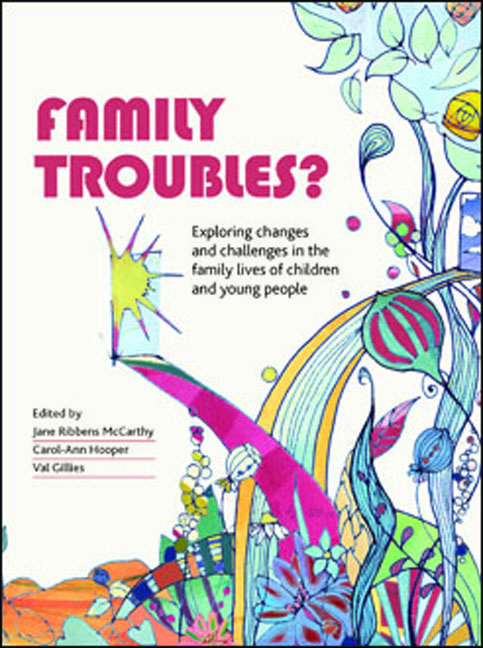Book contents
- Frontmatter
- Contents
- Notes on contributors
- Foreword
- Preface
- 1 Troubling normalities and normal family troubles: diversities, experiences and tensions
- Part One Approaching family troubles ? Contexts and methodologies :Introduction to Part One
- Part Two Whose trouble ? Conteste d definitions and practice: Introduction to Part Two
- Part Three The Normal, The Troubling And The Harmful?: Introduction to Part Three
- Part Four Troubles and transitions across space and culture: Introduction to Part Four
- Part Five Working With Families: Introduction to Part Five
- Index
6 - Disabled parents and normative family life: the obscuring of lived experiences of parents and children within policy and research accounts
Published online by Cambridge University Press: 07 September 2022
- Frontmatter
- Contents
- Notes on contributors
- Foreword
- Preface
- 1 Troubling normalities and normal family troubles: diversities, experiences and tensions
- Part One Approaching family troubles ? Contexts and methodologies :Introduction to Part One
- Part Two Whose trouble ? Conteste d definitions and practice: Introduction to Part Two
- Part Three The Normal, The Troubling And The Harmful?: Introduction to Part Three
- Part Four Troubles and transitions across space and culture: Introduction to Part Four
- Part Five Working With Families: Introduction to Part Five
- Index
Summary
Introduction
This chapter examines understandings of family life where a parent has an impairment or experiences chronic health difficulties. Over the past two decades, the experiences of families that include a disabled parent have become increasingly visible through research, wider awareness-raising activity and policy debate and development. The strands of research and conceptual work in this area (including our separate work, on which we draw here) often centre around either young people with caring responsibilities for a family member, or disabled adults with dependent children. This is reflective of divisions in academic enquiry (such as ‘childhood studies’ and ‘disability studies’) and in policy and practice (such as ‘children and families’ and ‘adult social care’).
Prior to the 1990s, work in relation to disabled people as parents was often impairment-specific and concerned with ‘risks’ as regards child development (Olsen and Clarke, 2003). A developing policy focus on carers in the 1980s was built upon in the 1990s to identify experiences of care-giving that had previously been under-recognised. One of the most influential strands of work was that developed by Becker and his colleagues in relation to ‘young carers’ (Aldridge and Becker, 1993a, 1993b). Early work in this field was focused on the experience of young carers, who were considered to have missed out on the choices and opportunities of a ‘normal’ childhood: the policy and practice response was to develop services focused on redressing children's losses. This was critiqued as marginalising and problematising disabled adults and as producing a welfare category that insufficiently examined how young people (carers and non-carers) might experience disadvantage and loss of opportunity resulting from lack of support for their parents (eg Morris, 1997; Olsen and Parker, 1997). Further important contributors to debate and understanding in the 1990s and 2000s include disability and parenting organisations (eg the Disabled Parents Network and the Disability, Pregnancy and Parenting International), young carers organisations (eg Princess Royal Trust for Carers) and practice-focused research and development work (eg Morris and Wates, 2006, 2007; Commission for Social Care Inspection, 2009).
As social researchers, we have worked separately on research focused primarily on the experiences of disabled parents (Clarke) and of young carers (O’Dell), but share an interest in conducting research that engages with people's lived experience and seeks to contribute to service and policy development, but avoids a service-led approach.
- Type
- Chapter
- Information
- Family Troubles?Exploring Changes and Challenges in the Family Lives of Children and Young People, pp. 75 - 84Publisher: Bristol University PressPrint publication year: 2013

